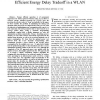Free Online Productivity Tools
i2Speak
i2Symbol
i2OCR
iTex2Img
iWeb2Print
iWeb2Shot
i2Type
iPdf2Split
iPdf2Merge
i2Bopomofo
i2Arabic
i2Style
i2Image
i2PDF
iLatex2Rtf
Sci2ools
CN
2007
2007
A MAC layer power management scheme for efficient energy delay tradeoff in a WLAN
— Energy efficient operation is of paramount importance for battery-powered wireless nodes. In an effort to conserve energy, standard protocols for WLANs have the provision for wireless nodes to “sleep” periodically. In this paper we first consider the problem of optimizing the timing and duration of the sleep state of a single wireless node (or user) with the objective of minimizing power consumption with respect to a QoS constraint. The QoS parameter that we have focused on is average packet delay. Using a Dynamic Programming formulation, coupled with a duality argument, we solve the optimization problem numerically. Using a branching process analysis, we were able to derive closed form expressions for the optimal sleep duration, as well as the associated minimal rate of power consumption. We show that the optimal power cost derived from the 1-user Dynamic Programming (DP) formulation provides a lower bound to the average power consumption for the multiple user case. To gain be...
| Added | 12 Dec 2010 |
| Updated | 12 Dec 2010 |
| Type | Journal |
| Year | 2007 |
| Where | CN |
| Authors | Mahasweta Sarkar, Rene L. Cruz |
Comments (0)

